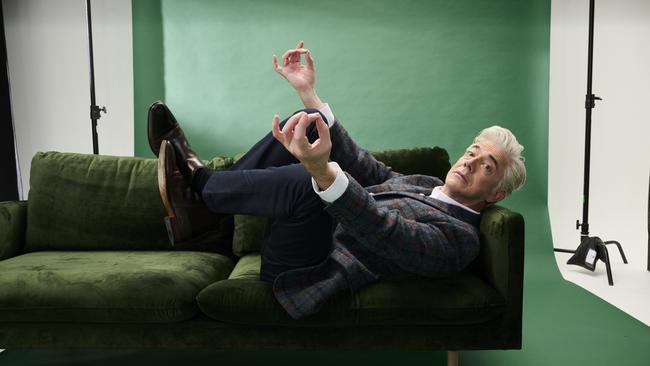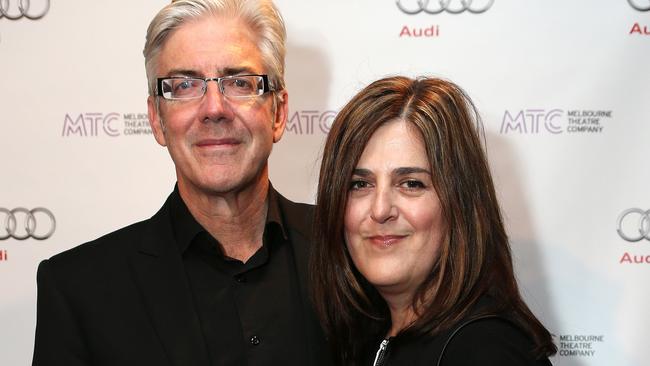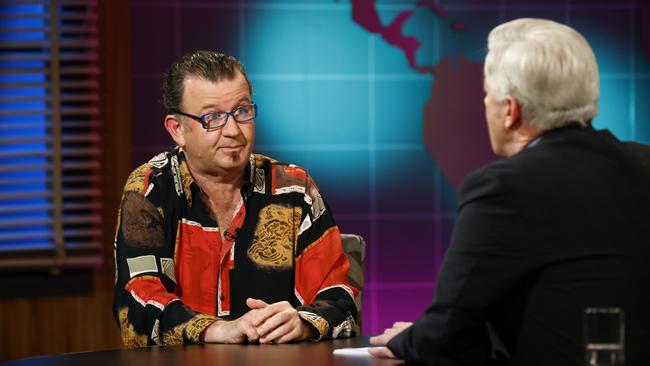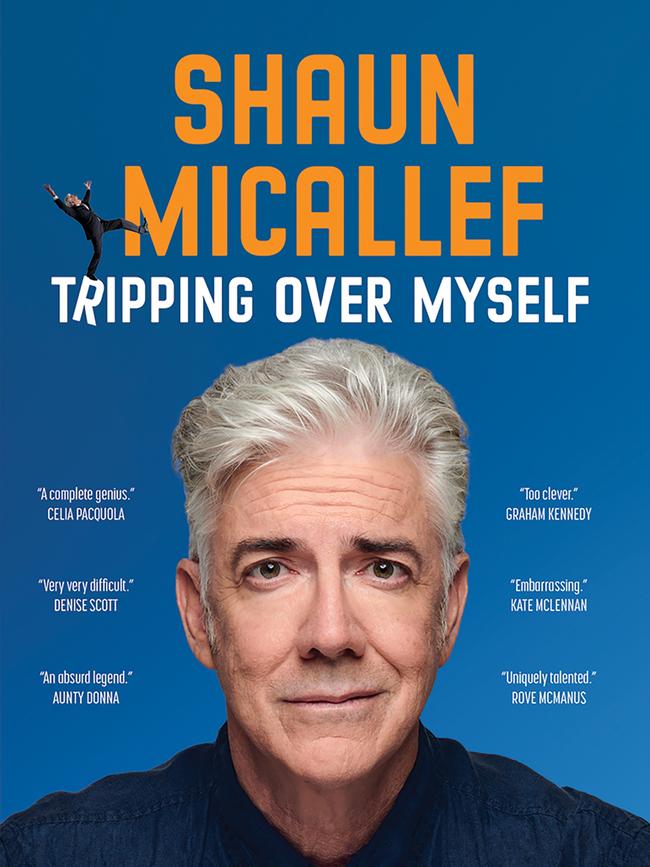Shaun Micallef on ending Mad as Hell, depression and a fleeting brush with Princess Diana on an Adelaide dance floor
‘She was a princess and I was an idiot in a yellow jumper’, writes Shaun Micallef on his brief encounter with Lady Di in Adelaide in the 1980s, in a new book that also tackles his battles with depression, workaholism and cancel culture.
VWeekend
Don't miss out on the headlines from VWeekend. Followed categories will be added to My News.
Shaun Micallef, resplendent in yellow velour windcheater, dancing in the near vicinity of the future King Charles III at a daggy refectory at Adelaide University somewhere back in the 1980s is exactly the kind of content you would hope for in a memoir.
It’s a kind of perfect Micallef story. The kind that has taken him from writing for sketch show Full Frontal to the political satire of Mad as Hell. Funny, but also absurd. Believable, but it still makes you want to check Google. Turns out it’s true. Charles and his first wife Princess Diana dropped in at the Helen Mayo Refectory at Adelaide University in 1983 for a “young people’s dance’’.
Back then the young Micallef was studying law but found himself invited to the big occasion. Of course, he, like everyone else at the time, was more interested in Princess Di than her staid-looking husband.
In his new book, Tripping over Myself, the now 60-year-old Micallef sets the scene: “They were mingling with various quasi-dignitaries when suddenly the DJ put on Haircut One Hundred’s Love Plus One. Charles and Di took to the floor to much cheering”.
Students, including Micallef, joined in.
“The princess, of course, was dancing with her husband, but at one point she spun around at the exact moment I did and if you had taken a picture of it and cropped everybody else out, including Charles directly behind her, it would have appeared as if Di and I were grooving together,” he writes.
“Our eyes met for the briefest of moments and who knows what might have transpired had things been different. But it could never be. She was a princess married to the next in line to the throne and I was an idiot in a yellow velour jumper.”
Of course, this was all written before Charles ascended to the big gig as King and Micallef laughs and acknowledges he may have “buried the lead” on that story.
“When I tell the story selling the book, I’ll have to change the emphasis slightly,’’ he says.
“It was quite nice they came along and participated in such a low-rent activity. There was a surprising lack of formality to the whole thing. It was just kind of funny. I suppose. We all found it hilarious.”

Tripping over Myself is Micallef’s recollections of his life in comedy,released just as Mad As Hell winds up after an 11-year run during which it became compulsory viewing for anyone with even a passing interest in politics.
“I did want to sort of talk about comedy, that was the intention to talk about why I like it and how it works and my experiences with it,’’ Micallef says.
There is no doubt it’s a funny book. Anyone familiar with the work of Micallef over the years, will be familiar with his slightly off- beat take on the world, the witty asides, the clever use of language, the skewering of pomposity.
There are giggles aplenty in Tripping Over Myself. Even down to the little running man flick book animation. But it’s also more than that.
There is the occasional feeling reading the memoir that Micallef is almost revealing more about himself at times than he really wants.
In one passage he acknowledges he hasn’t spent much time talking about his wife Leandra and their three sons, but in another talks about how work has led him at times to be an absent husband and father.
Or how depression overtook him at one point where his work and family life felt like it was falling apart. He half-jokingly refers to it as his “midlife crisis’’.
What Micallef says he discovered in writing the book was that he needed to put context around his life, to talk about “where his head was at’’ during different phases of his career.
“I was trying to be respectful of the story; I didn’t want to bend things or break things to get a laugh,” he says.
“I thought I’ll stick to the truth. I’ll pick the stories that are funny because they’re true. A lot of them are about failure and pulling up well short.
“If the book is worth writing at all, if it’s worth putting down some of your stories anyway, you’ve got to be as forthright and honest as you can, otherwise it’s just a series of anecdotes.’’
Part of it was dealing with his experience with depression.
At the time he admits he had taken on too much. He had moved from shooting the game show Talkin’ ’Bout Your Generation into the first season of Mad As Hell, then straight into filming the television drama series Mr & Mrs Murder.
“I did have to at least sketch that with more than just charcoal and pencil. I had to kind of put a bit of colour into it. Be a little more frank and put the jokes to one side,” he says.
He also says he didn’t want to be flippant about it, because there would be people reading it who had been through something similar and he didn’t want to seem to be making light of their problems.
In the book he paints himself as something of a control freak during the filming of Mr & Mrs Murder. As perhaps even someone whose ego had run away from itself. Unasked, he was rewriting scripts and causing chaos.
“Eventually I turned into an ogre, unhappy with much in the scripts and now even having a go at altering the carefully plotted narratives that several departments were relying on not to change at the last minute,’’ he writes.
“On one occasion, the night before a shooting day, sending the director an email entitled ‘Secret Script’, in which I rejigged several scenes, changed interiors to exteriors and even involved some props which I made myself and brought from home. Madness.”
It was after the shooting ended, Micallef found himself in trouble. He wasn’t writing, he was easily given to tears. He realised he had neglected his wife Leandra and their sons as he had pursued his career.

Micallef talks of his depression as being with a “small d”. He was never officially diagnosed and wasn’t treated by a professional.
“I still haven’t quite worked out what it was. That was difficult because I had to kind of make sense of something now, that I really dared not try and make sense of.”
Speaking with his wife helped. As did his own fear of becoming a cliche. “Occasionally I’d flit to an out-of-body perspective and see what I was going through for the sad-clown Pagliacci bullshit it was,” he writes.
He started working again and found comedy, making it and watching it, a release.
“Work that often involves laughter and jollity and putting on a smile – that is my way, often, of handling that sort of thing and that works for me,’’ he says.
He started asking questions about spirituality and religion and made a documentary series, before coming to the conclusion there was no afterlife and our purpose in life is to make things easier for others.
But writing the book, Micallef says, helped him see the “pattern’’ of his life.
Micallef came late to television. He grew up in safe Adelaide, raised by loving parents Judy and Fred, a Maltese immigrant, made his way through respectable Catholic schools and went to uni to become a lawyer.
It was at university that some of that early bubble of safety was burst as he encountered kids from wildly different and more privileged backgrounds and began to understand the differences race, class and money could make.
“Only at university did it become clear that these things were important to some people,’’ he writes.
“It was the first time I was called a wog – in jest I was assured – and I was the subject of mild ridicule when someone turned up to my 21st birthday and cracked wise about my choice of celebratory spumante.’’
But it was also there he would become involved in writing and performing through the Law School Revue (sample title: Subpoena A Hard Days Night).
He would meet long-time collaborators Francis Greenslade and Gary McCaffrie and, on his last day at law school, wife Leandra.
After study, Micallef worked for a law firm called Ward and Partners for 10 years He thought that was going to be his life.
He didn’t know how to build a career in comedy, which he thought was more hobby than profession.
But at Leandra’s urging and with help from McCaffrie, who was writing TV comedy, he decided to give it a crack.
He found a job on Irish comedian Jimeoin’s TV show, then the sketch comedy series Full Frontal.
He didn’t see himself as a performer initially, but his characters – such as the send up of male model Fabio, and the brain-damaged boxer Milo Kerrigan – made him one of the show’s bigger stars. Another was Eric Bana, who also did quite well.
It was the start of a long career in television, albeit with varying degrees of success. There were, among many others, the Micallef Program, Micallef Tonight, Newstopia, Talkin’ ’Bout Your Generation, and Shaun Micallef’s Mad as Hell.
Micallef believes his late start in television, plus the fickle nature of the industry, is what may have led him to load himself up with too much work.
“I think I was probably drunk on it when I started,’’ he says. “I just had too much of it, just consumed it. I was ravenously hungry for whatever it was.
“I’m trying to point out here it wasn’t about fame or anything. That was irrelevant, but it was just about, I guess, expressing myself in that way which I’d not been able to do otherwise.”

Micallef says he’s finally learned how to say no. And part of that has been letting go of Mad As Hell. In a country that struggles with TV comedy, Mad As Hell has been a highlight. It saw off prime ministers through Gillard, Rudd, Abbott, Turnbull, Morrison and ends with Albanese in charge.
Micallef’s ability to raise a laugh in the pause between the words “Scott Morrison” and “Prime Minister” became a staple of the show.
“We took our lead from the way that newsreaders would constantly have to say his name and I think that was probably because there’d been a few prime ministers up to that point,” he says.
It gave us a rotating cast of ridiculous characters including Darius Horsham. Draymella Burt, Brion Pegmatite, Dolly Norman and regular segments such as Lamentable Puns.
Micallef says Mad as Hell started out looking at how politics was reported, but it came to focus more on the politicians themselves, what they said and how they said it. The relentless lampooning of former Labor leader Bill Shorten for his “zingers” which were terrible jokes badly delivered, being an obvious case.
He says it was just as well he didn’t meet too many politicians along the way.
“I’m glad I don’t know them because if I did know them, I think they would be humanised in my mind. They’d be three-dimensional and it might be harder to make jokes about them,” he says.
“So they’re just two dimensional puppets as far as I’m concerned. How they present on the news is the totality of them as far as we are concerned.”
Micallef says comedy hasn’t become harder over the years, despite the protestations of those who would tell you “cancel culture” is ruining the art form.
“You can turn on a Netflix special and you can sit there for 90 minutes hearing a comedian complain about how they can’t say anything anymore,’’ he says.
“We don’t tend to talk about cancel culture because I, personally, I don’t think it really exists.”
Having said that, he concedes there are jokes that he made 10 years ago that he wouldn’t make now. But he says that is progress and evolution.
“I think a lot of the difficulty with some people who are my age, gender, colour, is that they might do things unthinkingly, because they’ve always done it,” he says.
“I am aware that we dropped some things, but I was never conscious of being forced to drop them or that we missed them. You know, there always seems to be something else you could do instead. And if you can’t, if you end up with no act because of the way things are at the moment, then it wasn’t much of an act.”

Micallef isn’t sure what’s next for him beyond a long holiday with Leandra.He would like to see the ABC divert the resources it provided Mad as Hell to someone younger so “we have some different voices commenting on what is going on”.
He has offered himself as a mentor to anyone needing his help. Micallef has a theory that everyone has three half hours of TV in them.
“And then the fourth show comes along and they are stuck, they’ve used all their tricks, so I will help them with the fourth one,’’ he says.
Micallef ended Mad as Hell because it was a seven-day-a-week operation and he wanted to try something new. That could be working for others as an actor, or stepping behind the camera.
“I’m kind of used to getting my own way,” he says. “It’d be nice for someone to say, ‘no, don’t do that, do something else, do something better than that’,” he says before stopping for a last joke.
“Yeah, I’ll probably regret it in three weeks and I’ll be ringing the ABC asking to put another season on.”
More Coverage
Originally published as Shaun Micallef on ending Mad as Hell, depression and a fleeting brush with Princess Diana on an Adelaide dance floor



